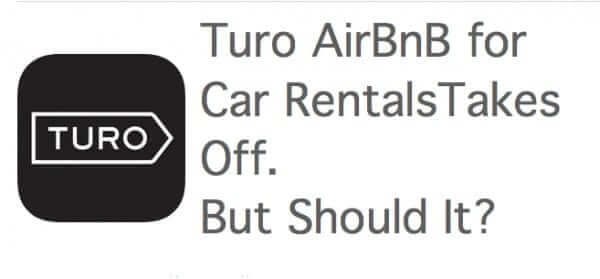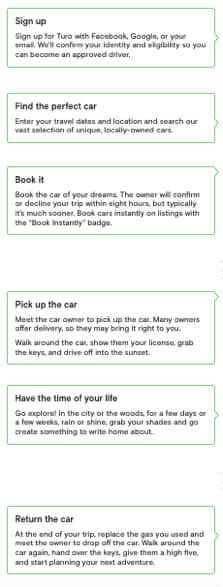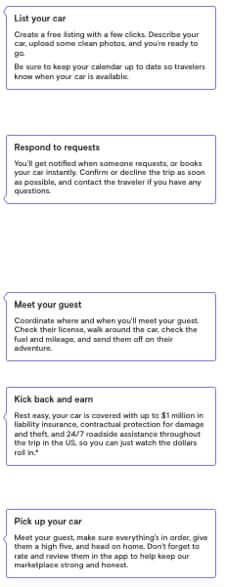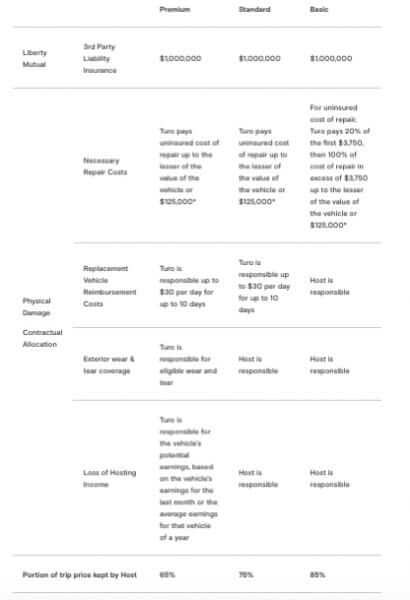
Did you know that there is what amounts to an Airbnb for renting cars? Meet Turo, the gig economy app that describes itself as “Way better than a rental car”, and boasts “Book unforgettable cars from local hosts around the world.” Yes, it’s exactly what it sounds like: you rent someone else’s car, through the Turo app, just as you would rent someone’s house through Airbnb. In fact it’s sort of like the unholy love child of Airbnb and Uber.
This of course raises all sorts of questions, including how safe is it for the car renters, as well as how safe is it for those who are renting out their cars?
The way that it works as a car rental customer is that you download the Turo app onto your smart phone (app for iOS here, and app for Android here), and then you can open the app and reserve someone else’s car whether local or in another city, or even in another country.
How Turo Works When Booking a Car

According to Turo, here’s how it works when booking a car:
“Sign up
Sign up for Turo with Facebook, Google, or your email. We’ll confirm your identity and eligibility so you can become an approved driver.
The Internet Patrol is completely free, and reader-supported. Your tips via CashApp, Venmo, or Paypal are appreciated! Receipts will come from ISIPP.
Find the perfect car
Enter your travel dates and location and search our vast selection of unique, locally-owned cars.
Book it
Book the car of your dreams. The owner will confirm or decline your trip within eight hours, but typically it’s much sooner. Book cars instantly on listings with the “Book Instantly” badge.
Pick up the car
Meet the car owner to pick up the car. Many owners offer delivery, so they may bring it right to you. Walk around the car, show them your license, grab the keys, and drive off into the sunset.
Have the time of your life
Go explore! In the city or the woods, for a few days or a few weeks, rain or shine, grab your shades and go create something to write home about.
Return the car
At the end of your trip, replace the gas you used and meet the owner to drop off the car. Walk around the car again, hand over the keys, give them a high five, and start planning your next adventure.”
That sounds not unreasonable, even fun.
But what about the flip side? What about the people who are renting out their cars to total strangers, about whose driving skills (if any) the car owner has no idea? After all, you only have to show a license, not take a driving test or even confirm your driving abilities.
Here’s what Turo has to say about listing your car for rent with them:
Listing Your Car with Turo

“List your car
Create a free listing with a few clicks. Describe your car, upload some clean photos, and you’re ready to go. Be sure to keep your calendar up to date so travelers know when your car is available.
Respond to requests
You’ll get notified when someone requests, or books your car instantly. Confirm or decline the trip as soon as possible, and contact the traveler if you have any questions.
Meet your guest
Coordinate where and when you’ll meet your guest. Check their license, walk around the car, check the fuel and mileage, and send them off on their adventure.
Kick back and earn
Rest easy, your car is covered with up to $1 million in liability insurance {Ed. note: we’ll get back to that in a moment}, contractual protection for damage and theft {Ed. note: ditto}, and 24/7 roadside assistance throughout the trip in the US, so you can just watch the dollars roll in.*
Pick up your car
Meet your guest, make sure everything’s in order, give them a high five, and head on home. Don’t forget to rate and review them in the app to help keep our marketplace strong and honest.”
*Oh, and you probably noticed that asterisk. Here’s what that says:
“All Liberty Mutual liability insurance in the US is offered through Turo Insurance Agency. Terms, conditions, and exclusions apply.”
Hrrrrm…. Turo Insurance Agency.
On another page, Turo explains that “Turo is not an insurance company and does not insure Hosts or Guests. Turo does make Protection Plans available to US Hosts and US Guests. All Protection Plans include third-party liability insurance from Liberty Mutual under a policy acquired by Turo via Turo Insurance Agency, LLC, a licensed insurance producer.
Soooo…Turo “insurance agency/not an insurance company” runs their own insurance agency, through which Turo Airbnb-like car rental business buys insurance and then almost certainly deducts it as a fat business expense. (To be clear, the difference between an insurance agency and an insurance “company” (we assume they mean “carrier”) is that the agency sells policies on behalf of the carriers.
So every time Turo-the-car-company covers one of their hosts through Turo-the-insurance-agency, Turo is making money just on that transaction, as well as writing it off as a business expense for Turo-the-car-company. Not that there is necessarily anything wrong with that.
But wait, there’s more.
Because the owner of the car – the person who is renting out their car through Turo (called the ‘Host’, the person who is going to take that car for a spin is called the ‘Guest’) has to pay Turo for that insurance. Yes, the very insurance that Turo-the-car-company is already making money on because they sold it to themselves through Turo-the-insurance-agency, is being sold again, to the Host.
Turo offers three different levels of insurance policies for the Hosts, and the payment for that insurance is taken off the top before the Host ever sees a dime of the Guest’s money.
In other words, the Host never gets 100% of what the Guest pays, but rather increasingly smaller percentages of what the Guest pays the more the Host wants to protect themselves and their car against their car being damaged while being driven, parked, and generally used by a Guest.
Turo offers their Hosts a choice of three different insurance coverages, Premium, Standard, and Basic.

As you can see, for the Basic policy, Turo keeps 15% of the money that the Guest pays; for the Standard policy, Turo keeps 25%, and for the Premium policy, Turo keeps 35%.
Depending on the policy, the Host can still be responsible for quite a bit – in fact, the host can get screwed. For example, in all but the Premium insurance plans the Host is always responsible for both exterior wear and tear, and for loss of hosting income if their car is damaged.
Under the Basic plan, for those repair costs that Turo deems “necessary” but still “uninsured”, Turo pays just 20% ($750) of the first $3750 in such repairs, meaning that the Host has to kick in $3000 before Turo will cover another dime.
(You can read Turo’s full description of their various insurance policies here.)
If it seems like Turo is playing both ends against the middle, it did to us as well. It seems as if no matter what insurance policy a Host takes out, the winner is Turo, both in the earnings-to-accident-repair-payout department, and of course on the other end, selling the insurance to themselves.
In fact, more than anything, Turo seems like an insurance arbitrage play.
And here’s where it gets really interesting: if the Guest has an accident while driving a Host’s car, the Guest pays Turo. Despite the repairs to the car already being covered by insurance (which Turo sold to itself).
Says Turo on its insurance for guests page, “The primary guest is financially responsible for all Physical Damage to the booked vehicle, as well as Related Costs.”
All of this made us wonder just how this actually works, and just how protected are those who rent their own cars out through Turo, and if someone has an accident while driving a car they rented through Turo, just how does that work for the owner of the car?
It turns out that we are not the only ones wondering this.
In a comment on a YouTube video about Turo, one user shared this enlightening information, including a transcript of an actual conversation that they had with a Turo representative:
“I think the Turo owner protection plan is kinda a scam in a way so I contacted the Turo support with my questions. I’d like to share with you our conversation and I’m curious to hear what you all think of this. Below is our conversation:
Me: Hi I have a question about the owner protection plans. I wonder what happens when my renter get into an accident with my car and I only have the basic protection plan, which says will cover the cost beyond 3000 dollars. Let’s say the cost for repair is 2000 dollars, am I supposed to pay that 2000 myself? Thank you
Turo: We deal with the guest and host protection plans separately. As long as you select a protection plan for yourself and are in line with our terms of service, we are going to pay out for damages according to that. What we charge the guest for damages is separate.
Me: Thanks for the explanation. But there are still something I don’t understand. As you said you deal with the host and guest separately. So when the renter gets into an accident with Basic renter package which should only cover the cost beyond 3000 dollars, and let’s say the actual repair cost of my car is 2000 dollars. In this case the renter will pay Turo 2000 dollars, but since I only have Basic plan as an owner, I still need to pay for the repair myself since the Basic owner protection plan doesn’t kick in until 3000 dollars. Is this correct? If so how is it fair for both the renter and the owner to pay for the cost.
Turo: We would pay you out according to the plan you chose. So if you chose basic and the damages were $2000, we would pay you 20% no matter what protection plan the guest chose. With the basic protection plan for a host Turo pays 20% up to first $3,750 of damage and 100% after that, up to a $125,000 limit.
Me: Thanks for responding. So I pay 80% of the cost and Turo pays 20% I understand that. But the renter also pays the full cost right? So Turo makes money out of my accident? Because the total payment from both me and the renter is double the actual cost for the repair. How do you explain that?
Turo: In that case we would, but there are also other fees associated with the claim that we have to pay out since we are not an insurance company.
”
Suddenly all of those insurance clauses in the standard car rental agency contract such as from Hertz, Avis, or Budget, are starting to look pretty good to us.
The Internet Patrol is completely free, and reader-supported. Your tips via CashApp, Venmo, or Paypal are appreciated! Receipts will come from ISIPP.










For some reason, my scam alert is active. I do not see why, but the little red light is blinking. Perhaps I am paranoid.
It just seems to me, that whether you are renting out your car, or renting a car, you could get into some very expensive trouble. And your “Real” insurance company, COULD cancel your insurance, and even blacklist you, making the obtaining of further insurance difficult.
Now, there is another aspect you did not touch on.
Income taxes. So… you rent out your vehicle, and expect to earn an income therefrom. But the way the scheme seems to work, it would appear very difficult to make a dime. This would result in constant “tax losses” on your “little enterprise”. (Pun intended.) I do not think that the CRA (Revenue Canada) would be much entranced. I would assume that the IRS would feel the same way.
I wonder how many people have managed to enjoy the glowing promises this company makes to people. Have you managed to find any data, here?